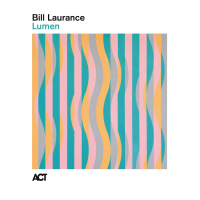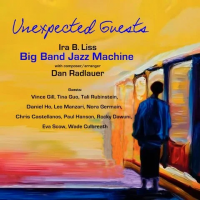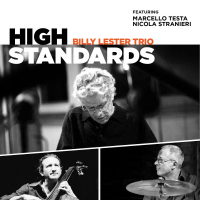Home » Jazz Articles » Album Review » Steve Khan: Public Access / Headline / Crossings
Steve Khan: Public Access / Headline / Crossings
2018's Public Access / Headline / Crossings picks up the Eyewitness story six years later and is another collection of mined gems. The two-CD set collects (almost) two full albums, plus half of another that was originally split between Eyewitness and an acoustic trio. One track from the groove-heavy Public Access (GRP, 1989), which occupies most of the first CD, is unfortunately omitted due to time restrictions since the first disc of this current set already clocks in at 77 minutes, and the second at 79. As beautiful as Eyewitness' rendition of "Dedicated to You" is—and despite its significance as the first song Khan ever included on one of his albums that was co-written by his renowned father,

Sammy Cahn
composer / conductor1913 - 1993
The three Eyewitness tracks from Headline (Polydor/Mesa/Blue Moon, 1992) are split over the two CDs—and this time, again due to time restrictions, are not presented in their original running order. Headline, as a whole, continued another major shift that Khan introduced on Let's Call This (Mesa/Blue Moon, 1991): beyond working with an all-acoustic trio (

Ron Carter
bassb.1937

Al Foster
drums1944 - 2025

Ornette Coleman
saxophone, alto1930 - 2015

Wayne Shorter
saxophone1933 - 2023

Joe Henderson
saxophone1937 - 2001

Thelonious Monk
piano1917 - 1982
Crossings (Verve/Polygram, 1994), the third album in this collection, is presented in its entirety and continues Khan's shift away from original material to imaginative covers, but this time entirely within the context of Eyewitness.
The original Eyewitness—Khan, drummer

Steve Jordan
drumsb.1957

Anthony Jackson
bass, electric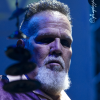
Manolo Badrena
percussion
Rob Mounsey
keyboards
Joe Zawinul
keyboards1932 - 2007

Weather Report
band / ensemble / orchestra
Aretha Franklin
vocals1942 - 2018

Ben Sidran
piano and vocalsb.1943

Michael Franks
vocalsb.1944

Bob James
pianob.1939

Diane Schuur
vocalsb.1953

Miles Davis
trumpet1926 - 1991
Given Local Color's significantly altered (and appealing) approach, where Khan engaging with Mounsey's drum machine-driven, synth-heavy explorations, the return of a slightly altered Eyewitness lineup on Public Access was most welcome. Jordan was gone, having hooked up with

The Rolling Stones
band / ensemble / orchestrab.1962

Keith Richards
guitar, electricb.1943

Chick Corea
piano1941 - 2021

Dave Weckl
drumsb.1960
First, the guitarist's interest in Latin/AfroCuban rhythms, already in evidence throughout The Eyewitness Trilogy (and, truthfully, alluded to even earlier with his three albums for Columbia), had become even more dominant in the intervening years, with Public Access continuing Khan's hybridization of rhythms like the cha-cha with back-beat driven grooves on the captivating opener, "SisЁҰ," and slightly more relaxed "Mambosa." Public Access also demonstrates Khan's clear interest in returning to traditional swing—albeit, as ever, in a wholly modern context—on the fiery "Blue Zone 41" and fluctuating tempos of "Butane Elvin." Khan's interest in color and reverb/chorus-drenched atmospherics—particular evident on "Silent Screen," "Botero" and the album-closing "Mama ChЁ®la"—had expanded even further with the introduction of a harmonizer, allowing Khan to layer harmonies over his primary guitar lines in real time, as he does during his solo on "SisЁҰ."
Amongst Khan's greatest strengths, in particular following his three Columbia recordings, has been an avoidance of any signatures or techniques. Yes, for example, he has and uses a whammy bar to great effect on Public Access' "Botero People," but it's something he uses sparingly, and only when the moment absolutely calls for it, rather than relying on it as a consistent signature.
Khan had evolved from the chops-heavy fusion guitarist of Tightrope / The Blue Man / Arrows to a more considered, almost pianistic (but still chops-capable) player with his landmark 1980 solo record, Evidence. There, he applied layers of acoustic and electric guitars to create vivid and inimitable interpretations of music by Shorter, Zawinul,

Lee Morgan
trumpet1938 - 1972

Randy Brecker
trumpetb.1945

Horace Silver
piano1928 - 2014

Thelonious Monk
piano1917 - 1982
Whether playing Khan originals, music culled from studio jams recorded during the Casa Loco sessions and reworked into "SisЁҰ," the funkier "Kamarica," "Botero People" and "Mama ChЁ®la" (and, consequently, compositionally co-credited to Khan, Jackson, Badrena, Jordan and Weckl), or jazz and Great American Songbook standards, Eyewitness remains instantly recognizable, across The Eyewitness Trilogy and the three recordings represented on Public Access / Headline / Crossings.
Beyond Khan's tasteful use of a warmer Gibson ES-335 and more crystalline ESP Strat (the latter used, following Public Access, primarily for overdubs on the group's subsequent releases), Eyewitness' sound was quickly established and clearly defined, irrespective of who occupied the drum chair. Throughout its five-and-a-half studio albums and one extraordinary live album—a complete 1994 trio show (without Badrena), rescued from Germany's WDR radio archives, and released as The Suitcase (Tone Center, 2008)—it became, however, impossible to imagine Eyewitness without the dominant (but never domineering) presence of Anthony Jackson.
Jackson's ability as both groove-meister and contrapuntal foil for Khan, while always seeming to choose the absolutely perfect note for the moment, renders him essential to the Eyewitness sound, with a tone paradoxically muscular in its bottom end and bright enough, in its upper registers, to cut through everything and find its way to the forefront. Curiously, Jackson has always been loathe to solo, so Khan and Chambers had to employ a bit of friendly "faking out" to get what is a staggering duo with the drummer at the start of Headline's amiably swinging cover of Ornette Coleman's "Turnaround." The two also spar with some incendiary interplay at the conclusion of Khan's mambo-infused look at Joe Henderson's "Caribbean Fire Dance," which Jackson thought would fade...and does, but not until after his in-tandem feature with Chambers.
Jackson, too, seems capable of being joined at the hip with Khan, no more obviously than during the guitarist's solo on "Turnaround," where the contrabassist seems completely attuned to the guitarist's improvisational mindset: mirroring figures and echoing rhythmic passages with rare telepathy.
Badrena, too, helped forge Eyewitness' unique language and sound world. Whether using an array of acoustic percussion instruments or, beginning with Casa Loco and even more dominantly on Public Access, introducing then-nascent electro-percussion like Pearl's Syn-cussion, Badrena was, in many ways, the band's "X-factor," keeping everyone on their toes with completely unexpected injections, alongside more scored percussion parts. And, while he'd been heard singing on Weather Report's 1977 mega-hit Heavy Weather (Columbia), with Eyewitness it evolved into something even more unpredictable, even when singing pre-conceived lines on songs like "Kamarica" and "Mama ChЁ®la," both also featuring four additional vocalists layered alongside Badrena.
That's not to suggest that Eyewitness' three drummers didn't bring their own voices to the party. Weckl, in his early days with

Chick Corea
piano1941 - 2021
With the band rarely able to tour outside of New York and Japan, however, the Weckl incarnation of Eyewitness was short-lived. Khan, for reasons of both interest and practicality, moved to the acoustic trios of Let's Call This and half of Headline. But with

Dennis Chambers
drumsb.1959

John Scofield
guitarb.1951

Brecker Brothers
band / ensemble / orchestraBut as mind-blowing as Chambers could be, he'd never engaged in a group with such decidedly Latin leanings and, by the time he joined the group, disposition towards interpretation rather than original composition—though Crossings did present two new Khan compositions in the mambo-informed "Descarga Khanalonious" and greasy, funkified shuffle of "What I'm Said." Still, Chambers proved himself capable of swinging like a mo'fo' on "Turnaround" or engaging in a booty-shaking, 6/8 bembe rhythm with Badrena on Crossings' closer, a version of Bronislau Kaper and Gus Kahn's "While My Lady Sleeps." Even

Cole Porter
composer / conductor1891 - 1964
Yet to be mentioned, however, is one other aspect to Crossings that separates it from all the other Eyewitness releases: the appearance of saxophone great

Michael Brecker
saxophone, tenor1949 - 2007
Bill Milkowski, in his exceptional liner notes, details Khan's reminiscence of Brecker's funeral (passing, all too young, in 2007 at the age of 57): "Says Khan, 'I remember

Pat Metheny
guitarb.1954
Eyewitness is often lauded for its unique (especially for its time) language and approach, deeply felt grooves and stellar playing. Still, the group's telepathic ability to engage with one another on a profound level must not be overlooked, its intrinsic conversational ability a definitive one, whether on a buoyantly Latin-zed version of Monk's "Think of One," an even brighter "While My Lady Sleeps," or a deeply beautiful, balladic look at Lee Morgan's "Melancholee," all from Crossings.
Khan, more than many guitarists alive today, demonstrates remarkable knowledge and breadth when it comes to the jazz and Great American Songbook traditions. He selects material dating as far back as 1939 with Jack Lawrence and Arthur Altman's "All or Nothing at All"—originally a hit for

Frank Sinatra
vocals1915 - 1998

Tony Williams
drums1945 - 1997
Of the three albums represented here, only Public Access has been remastered, with a bit more emphasis on the bottom end than the thinner-sounding original. Headline and Crossings come from the original masters. Like ECM Records, when it reissues some of its older titles in box sets without remastering, the old adage "if it ain't broke don't fix it" applies here, too.
Khan says, in Milkowski's liners, that ..."all the great jazz albums have two things—mood and attitude." There's no denying that Eyewitness has both...in spades. With material ranging from just under five minutes to, on just a couple occasions, a little over ten, Khan and his group nevertheless approach the music with a lovely sense of relaxation, often taking more time than usually allowed on studio albums, to develop the mood before finally getting to themes and the heart of the matter.
Another collection of gems from a guitarist whose name has cachet, but nowhere near as much as he deserves, Public Access / Headline / Crossings continues BGO Records' reissue program of Khan recordings that were previously (and criminally) out of print. Perhaps the label might consider reissuing Evidence, along with the one-and-a-half albums featuring Khan's acoustic trio with Carter and Foster (an argument could be made for placing them together in a package, despite being separated by more than a decade). Guitar geeks and many others would, no doubt, appreciate having access to these fine albums. In the meantime, fans old and new can rejoice that, since 2015, the majority of Khan's work between 1977 and 1994 is now back in print, with fine liners and, where necessary, upgraded sound.
If The Eyewitness Trilogy introduced a group whose concept was innovative at the time and remains so today, the essential Public Access / Headline / Crossings takes it more than a few steps further, both in its move from original material to imaginative interpretations and in acting as a bridge between the guitarist's earlier recordings and later, even more decidedly Latin-oriented albums like Parting Shot, Borrowed Time (Tone Center, 2007) and Subtext (Tone Center, 2014). ">
Track Listing
CD1 (Public Access, 1989): SisЁҰ; Blue Zone 41; Kamarica; Silent Screen; Mambosa; Butane Elvin; Botero People; Mama ChЁ®la. (from Headline, 1992): Turnaround; Caribbean Fire Dance. CD2 (from Headline, 1992): All or Nothing at All. (Crossings, 1994): Descarga Khanalonious; Think of One; When IЎҜm Said; Pee Wee; ItЎҜs You or No One; I Love Paris; Capricorn; Melancholee; Inner Urge; While My Lady Sleeps.
Personnel
Steve Khan
guitarSteve Khan: guitar; Anthony Jackson: contrabass guitar; Manolo Badrena: percussion, vocals (CD1#1-8); Dave Weckl: drums (CD1#1-8); Lani Groves: additional vocals (CD1#1-8); Vivian Cherry: additional vocals (CD1#1-8); Janie Barnett: additional vocals (CD1#1-8); Kurt Yahjian: additional vocals (CD1#1-8); Dennis Chambers: drums (CD1#9-10, CD2); Michael Brecker: tenor saxophone (CD2#2, CD2#7, CD2#11).
Album information
Title: Public Access / Headline / Crossings | Year Released: 2018 | Record Label: BGO Records
Tags
Comments
PREVIOUS / NEXT
Support All About Jazz
 All About Jazz has been a pillar of jazz since 1995, championing it as an art form and, more importantly, supporting the musicians who make it. Our enduring commitment has made "AAJ" one of the most culturally important websites of its kind, read by hundreds of thousands of fans, musicians and industry figures every month.
All About Jazz has been a pillar of jazz since 1995, championing it as an art form and, more importantly, supporting the musicians who make it. Our enduring commitment has made "AAJ" one of the most culturally important websites of its kind, read by hundreds of thousands of fans, musicians and industry figures every month.





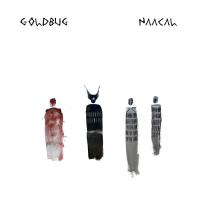

 Buy Now
Buy Now






